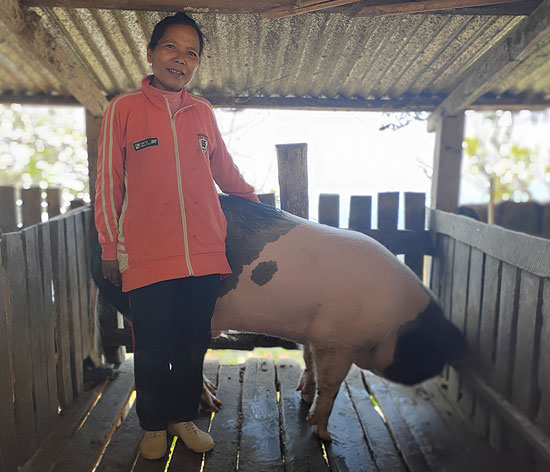
Life only seemed to get worse by the day for Mrs Darchuailovi , a resident of Chhingchhip South village in Serchhip district of Mizoram, India. The 56-year-old mother of four had been living in a joint family of 10 members that was surviving below the poverty line, with each day proving to be a growing struggle to make ends meet.
Their modest income – around Rs 2-3 lakh a year that they managed to earn from a small piggery farm and a pineapple orchard – was barely enough to sustain and provide for this large family.
Help came in the form of the North East Initiative Development Agency (NEIDA), an associate organisation of Tata Trusts set up in 2012 with the aim for grassroots development interventions in Arunachal Pradesh, Mizoram and Nagaland.
Better livelihood solutions
Pig rearing in the north-eastern states of Nagaland, Arunachal Pradesh and Mizoram is mostly a backyard activity, with animals feeding on household waste. Over the years, a general lack of awareness relating to the appropriate food breeding strategies and animal health, led to a decline in the quality of pork available in these regions. The quantity of meat also fell short and has not been enough to serve demand. Over the years, local pork supply has been dwindling and pig owners were facing income challenges.
NEIDA has been working to help improve local pig production as an alternative livelihood option for small farmers in these areas. The focus of its efforts has been on increasing the supply of pigs, improving breeds and training farmers on their care and management, so that they can earn better incomes from pig rearing.
Through the Trusts’ Piggery Enterprise Development initiative, NEIDA has so far helped 4,600 households set up properly managed piggery units. Over 100 health camps have been held during the project intervention period, engaging with around 80 ‘livestock service providers’. These are local youth who have been trained in modern techniques of piggery development and in horticultural activities. These service providers serve as a vital link between the community, the state government and the NEIDA team.
As part of this intervention, NEIDA has been developing low-cost pigsties, and providing veterinary care to rural farmers in the region, at their doorsteps. With infrastructural aid from the Department of Veterinary and Animal Husbandry in Mizoram, NEIDA has also produced and supplied animal feed to the project beneficiaries.
The role of community institutions has been crucial to the success of this programme. The Trusts have been incentivising these institutions so they can earn better incomes through retailing, supply of inputs and aggregation of produce.
New beginnings
After understanding her plight, the NEIDA team worked out a plan to help Mrs Darchuailovi with the necessary support and guidance to help grow her income. This involved a host of interventions and technical training on improved methods for pigsty construction, pig feed and medicine for their livestock.
With encouragement and support from NEIDA, Mrs Darchuailovi took up breeding of sow (adult female pigs), beginning with two sows. The knowledge and training her family received from NEIDA also helped improve their farming practices and manage their farm more efficiently.
As a result of these interventions, income at Mrs Darchuailovi's piggery farm began to grow, and more than doubled over the next five years . With an expanded piggery farm, she is now the proud owner of four breeding sows, with an average annual income of Rs 5-6 lakh.
This has had a significant impact on the family's financial stability. Through the sale of piglets and pork products in the local market, they are now able to generate a more consistent and higher stream of revenue than they could in the past. What’s more, the success of Mrs Darchuailovi's piggery farm has also had a positive impact on the local community, with other farmers in the area seeking her advice and guidance on modern pig farming methods.
Mrs Darchuailovi is now a role model for her community, inspiring others to take up pig farming as a sustainable and better livelihood option. “NEIDA has helped our family a lot. We received training and technical support from the material they shared with us. This has helped us tremendously to rise back on our feet, and generate a stable income to support ourselves,” she says.
The story of Mrs Darchuailovi and how she inspired an entire community, resonates with the core idea behind this intervention by NEIDA – if pig production becomes a significant domestic activity, the three north-eastern states will benefit in a number of ways. These include higher import savings, increase in local employment, availability of better quality meat for consumption and further development of a well-paying economic activity.
For the Trusts, this is yet another testament to how with the right support, guidance and resources, India’s small farmers can improve their livelihood and incomes, and even contribute to the economic development of their community.
